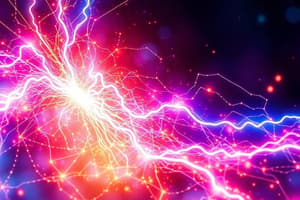Podcast
Questions and Answers
Which characteristic defines a substance as an electrolyte?
Which characteristic defines a substance as an electrolyte?
- Its aqueous solution conducts electricity. (correct)
- It dissolves readily in organic solvents.
- It is a strong oxidizing agent.
- Its melting point is exceptionally high.
What form must an electrolyte take to conduct electricity?
What form must an electrolyte take to conduct electricity?
- An aqueous slurry. (correct)
- A non-aqueous solution.
- A gas at standard temperature and pressure.
- A pure, dry crystalline solid.
Which state best promotes the current-carrying capability of an electrolyte?
Which state best promotes the current-carrying capability of an electrolyte?
- Electrolyte dissolved in water. (correct)
- A finely ground powder.
- The electrolyte heated to high temperatures.
- A compressed pellet.
Which condition is essential for a substance to be classified as an electrolyte?
Which condition is essential for a substance to be classified as an electrolyte?
How does an electrolyte facilitate the flow of electric current?
How does an electrolyte facilitate the flow of electric current?
Flashcards
Electrolyte
Electrolyte
A substance that conducts electricity when dissolved in water.
Aqueous solution
Aqueous solution
A solution where water is the solvent.
Conducts electricity
Conducts electricity
Allows the flow of electric current.
Slurry
Slurry
Signup and view all the flashcards
Electric current
Electric current
Signup and view all the flashcards
Study Notes
Electrolytes Defined
- An electrolyte is a substance whose aqueous solution or slurry conducts an electric current.
- This conductivity arises from the presence of ions in the solution.
- The ions are formed by the dissociation or ionization of the electrolyte in water.
- The presence and concentration of ions determine the extent of electrical conductivity.
Types of Electrolytes
- Electrolytes can be broadly categorized as strong electrolytes and weak electrolytes.
- Strong electrolytes completely dissociate or ionize in solution, resulting in a high concentration of ions.
- Weak electrolytes partially dissociate or ionize in solution, leading to a lower concentration of ions.
Examples of Electrolytes
- Common examples include acids, bases, and salts.
- Acids, such as hydrochloric acid (HCl) and sulfuric acid (H₂SO₄), ionize to release hydrogen ions (H⁺).
- Bases, such as sodium hydroxide (NaOH) and potassium hydroxide (KOH), ionize to release hydroxide ions (OH⁻).
- Salts, such as sodium chloride (NaCl) and potassium sulfate (K₂SO₄), dissociate into their constituent ions.
Factors Affecting Electrolyte Behavior
- The concentration of the electrolyte solution significantly impacts its conductivity. Higher concentrations generally result in higher conductivity due to a larger number of ions.
- Temperature also influences conductivity. Increased temperature increases the kinetic energy of the ions, leading to higher mobility and conductivity.
- The nature of the solvent plays a role. The ability of a solvent to dissolve and dissociate an electrolyte affects its conductivity.
- The presence of other substances in solution can either increase or decrease conductivity. Impurities or other ions can affect the total ion concentration.
Applications of Electrolytes
- Electrolytes are crucial in various applications.
- They are essential in biological systems, maintaining proper fluid balance and nerve function.
- In electrochemical cells, electrolytes facilitate the flow of electrons between an anode and a cathode, enabling the generation of an electric current.
- They are commonly used in batteries, where they allow the flow of ions between the electrodes.
- Electrolyte solutions are vital in industrial processes, such as electroplating and metal refining, as well as in various analytical techniques.
Differences between Strong and Weak Electrolytes
- Strong electrolytes completely dissociate in aqueous solution; weak electrolytes only partially dissociate.
- Strong electrolytes generally have a high electrical conductivity; weak electrolytes have a low conductivity.
- Strong electrolytes include strong acids, strong bases, and most salts; weak electrolytes include weak acids and weak bases.
Importance of Electrolytes in Biological Systems
- Electrolytes play a critical role in maintaining fluid balance and nerve function.
- Proper electrolyte concentration is essential for muscle contractions, nerve impulses, and other vital bodily functions.
- Imbalances in electrolyte levels can lead to various health problems.
Studying That Suits You
Use AI to generate personalized quizzes and flashcards to suit your learning preferences.




